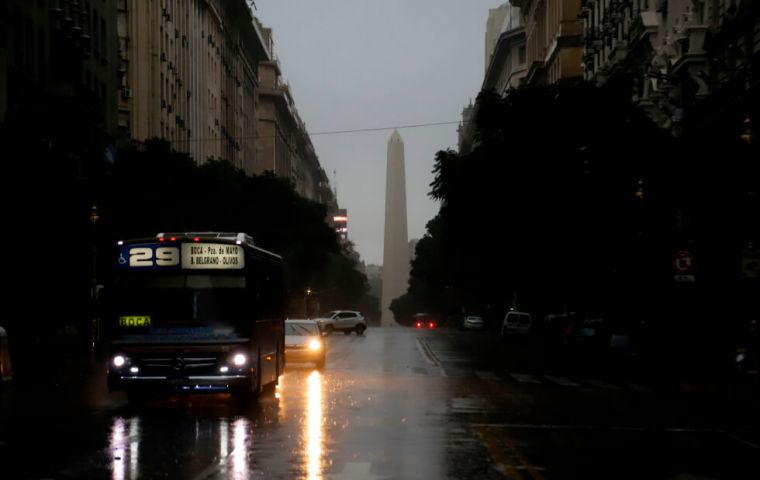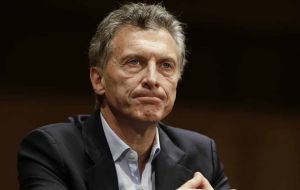MercoPress. South Atlantic News Agency
Massive blackout hits Mercosur; Argentina and Uruguay in the dark for six hours; major investigation promised
 The impact was particularly frustrating in recession hit Argentina because Sunday was Father's Day and brisk consumer and transport activities were expected
The impact was particularly frustrating in recession hit Argentina because Sunday was Father's Day and brisk consumer and transport activities were expected “This is an unprecedented case that will be investigated thoroughly,” Argentine President Mauricio Macri said on Twitter.
“This is an unprecedented case that will be investigated thoroughly,” Argentine President Mauricio Macri said on Twitter.  “This is an extraordinary event that should have never happened,” Energy Secretary Gustavo Lopetegui told a news conference. “It's very serious.”
“This is an extraordinary event that should have never happened,” Energy Secretary Gustavo Lopetegui told a news conference. “It's very serious.”  Uruguayan energy company UTE said that a failure in the Argentine system cut power to all of Uruguay at one point and much of Argentina
Uruguayan energy company UTE said that a failure in the Argentine system cut power to all of Uruguay at one point and much of Argentina A massive blackout left tens of millions of people without electricity in Argentina, Uruguay, Paraguay and parts of Chile and southern Brazil on Sunday. The Argentine president called it an “unprecedented” failure in the countries' interconnected power grid.
The impact was particularly frustrating in recession hit Argentina because Sunday was Father's Day and brisk consumer and transport activities were expected
Authorities were working frantically to restore power, and by the evening, electricity had returned to 98% of Argentina, according to state news agency Telam. Power also had been restored to most of Uruguay's 3.5 million people according to the local government managed electricity company, UTE, as well as to people in landlocked Paraguay, central South America. Likewise with a few areas in Chile.
Mercosur is made up of Argentina, Brazil, Paraguay and Uruguay, with Chile as an associate member. Power grids in the countries are closely integrated and connected to several huge dams, Yaciretá, Salto Grande, Chocón, Itaipu. The total population affected by the blackout was estimated in some 50 million: 44m Argentines, 3.5m Uruguayans and the rest among the other three countries.
Early Sunday, Argentine voters were forced to cast ballots by the light of cell-phones in gubernatorial elections. Public transportation was halted, shops closed and patients dependent on home medical equipment were urged to go to hospitals with generators. In some cities the water system also halted as did most gasoline stations, phones and internet.
“This is an unprecedented case that will be investigated thoroughly,” Argentine President Mauricio Macri said on Twitter.
“I was just on my way to eat with a friend, but we had to cancel everything. There's no subway, nothing is working,” said Lucas Acosta, a 24-year-old Buenos Aires resident. “What's worse, today is Father's Day. I've just talked to a neighbor and he told me his sons won't be able to meet him.”
“This is an extraordinary event that should have never happened,” Energy Secretary Gustavo Lopetegui told a news conference. “It's very serious.”
Argentina's power grid is generally known for being in a state of disrepair, with substations and cables that were insufficiently upgraded as power rates remained largely frozen for years during the Kirchner administrations years. Lopetegui said the blackout occurred around 7 a.m. local time when a key Argentine interconnection system collapsed. By mid-afternoon nearly half of Argentina's 44 million people were still in the dark.
An Argentine independent energy expert said that systemic operational and design errors played a role in the power grid's collapse.
“A localized failure like the one that occurred should be isolated by the same system,” said Raúl Bertero, president of the Center for the Study of Energy Regulatory Activity in Argentina. ”The problem is known and technology and studies (exist) to avoid it.“
The Argentine energy company Edesur said on Twitter that the failure originated at an electricity transmission point between the power stations at the country's Yacyretá dam and Salto Grande in the country's northeast.
Uruguayan energy company UTE said that a failure in the Argentine system cut power to all of Uruguay at one point and much of Argentina. The company said that most Uruguayan coastal cities, including the capital Montevideo had service restored by early afternoon and blamed the collapse on a ”flaw in the Argentine network.“
Argentina's secretary of energy said the power failed at 7:07 a.m. Only the southernmost province of Tierra del Fuego was unaffected.
”The cause is still under investigation,” the energy secretary's office said.
In Paraguay, power in rural communities in the south, near the border with Argentina, was also cut. The country's National Energy Administration said service was restored by afternoon by redirecting energy from the Itaipu hydroelectric plant the country shares with neighboring Brazil.
In Argentina, only the southernmost province of Tierra del Fuego was unaffected by the outage because it is not connected to the main power grid.
Southern Brazil and Chilean officials said their countries had quickly managed to courter effects and the blackout went mostly unnoticed.
Since taking office, Argentina's President Mauricio Macri has said that gradual austerity measures were needed to revive the country's struggling economy. He has cut red tape, and tried to reduce the government's budget deficit by ordering job cuts and reducing utility subsidies, which he maintained was necessary to recuperate lost revenue due to years-long mismanagement of the electricity sector.
According to the Argentine Institute for Social Development, an average family in Argentina still pays 20 times less for electricity than similar households in neighboring countries.
The subsidies were a key part of the electricity policy of President Néstor Kirchner's 2003-2007 administration and the presidency of Kirchner's wife and successor, Cristina Fernández in 2007-2015. Fernandez is now running for vice president in October elections.




Top Comments
Disclaimer & comment rules-

-

-

Read all commentsDark days for Argentina, EM Is Macri at fault?
Jun 17th, 2019 - 10:17 am 0REF: “Massive blackout hits Mercosur”:
Jun 17th, 2019 - 01:52 pm 0Can't expect much as long as one beggar/bugger depends on the other!
Argentina needs a complete overhaul and everybody needs to tighten their belts for the long haul. The previous Government needs to be locked up. No more social services for those who are physically able to work. Immigration needs to clean up shop. It's now or never.
Jun 17th, 2019 - 02:37 pm 0Commenting for this story is now closed.
If you have a Facebook account, become a fan and comment on our Facebook Page!